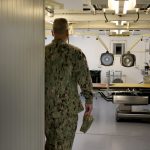Accountability for torture is a critical mechanism for prevention.
Following the September 11, 2001 terror attacks, the U.S. government patently authorized torture, with the participation of physicians, psychologists, and other health professionals. Medical ethics became subservient to military and policy objectives. No one who committed these crimes has ever faced justice, one of the worst betrayals of human rights law in our time, with serious consequences for the rule of law.
PHR works to expose the truth about medical complicity in U.S. torture, to repair policies and institutions, and to push for criminal and professional accountability. When the Senate Torture Report summary was released in 2014, PHR conducted a rapid expert analysis of the role of health professionals in CIA torture, including the horrific practice of rectal feeding. This form of torture is now officially prohibited by the World Medical Association.
PHR pursues accountability for health professionals who participated in intentionally inflicting pain and harm on detainees, including CIA psychologists James Mitchell and Bruce Jessen. As the architects of the CIA’s “enhanced interrogation” program, they conducted experimental research on detainees to study the effects of torture. We issued two in-depth reports documenting the crime of human experimentation, a claim used later in litigation against the two psychologists by several of their victims.
We also push health professional organizations to confront histories of complicity in torture and to ensure the reform of policies and practices aimed at preventing these abuses. We have brought years of pressure to bear on the American Psychological Association (APA) to bring its ethics policies in line with international standards against torture. In 2015, our efforts bore fruit when the APA banned psychologists from participating in national security interrogations and working at detention sites that violate international law. When elements in the APA tried to reverse the decision in 2018, PHR and our partners successfully prevented a roll-back of these hard-won anti-torture protections.

